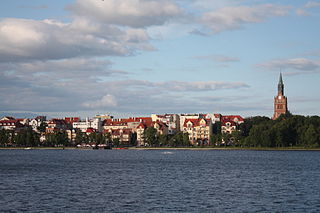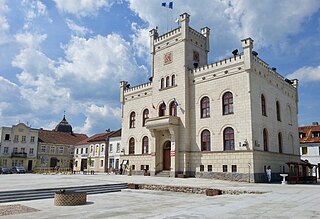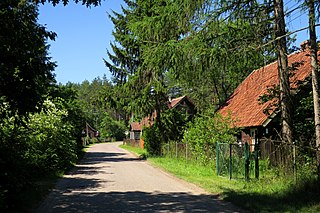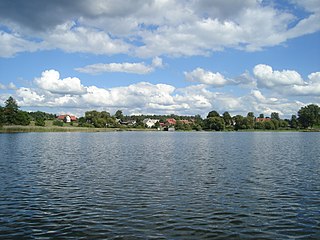Related Research Articles

Masuria is an ethnographic and geographic region in northern and northeastern Poland, known for its 2,000 lakes. Masuria occupies much of the Masurian Lake District. Administratively, it is part of the Warmian-Masurian Voivodeship. Its biggest city, often regarded as its capital, is Ełk. The region covers a territory of some 10,000 km2 which is inhabited by approximately 500,000 people.

The Masurians or Mazurs, historically also known as Prussian Masurians, are an ethnic group originating from the region of Masuria, within the Warmian-Masurian Voivodeship, Poland. They number around 5,000–15,000 people. In the 2011 Polish census, 1,376 individuals declared themselves to be Masurian as either a first or a secondary identification. Before World War II and its post-war expulsions, Masurians used to be a more numerous ethnic group found in the southern parts of East Prussia for centuries following the 16th century Protestant Reformation. Today, most Masurians live in what is now Germany and elsewhere.

Szczytno is a town in northeastern Poland with 27,970 inhabitants (2004). It is the seat of Szczytno County in the Warmian-Masurian Voivodship, within the historic region of Masuria.

Ełk, also seen absent Polish diacritics as Elk, is a city in northeastern Poland with 61,677 inhabitants as of December 2021. It is the seat of Ełk County in Warmian-Masurian Voivodeship. It lies on the shore of Ełk Lake, which was formed by a glacier, and is surrounded by extensive forests. It is the largest city and unofficial capital of historical Masuria. One of the principal attractions in the area is legal hunting.

Giżycko is a town in northeastern Poland with 28,597 inhabitants as of December 2021. It is situated between Lake Kisajno and Lake Niegocin in the region of Masuria, within the Warmian-Masurian Voivodeship. It is the seat of Giżycko County.

Pisz is a historic town in the Warmian-Masurian Voivodeship in northern Poland, with a population of 19,466 (2016). It is the seat of Pisz County. Pisz is situated at the junction of Lake Roś and the Pisa River, in the region of Masuria.

Mikołajki is a resort town in Mrągowo County, Warmian-Masurian Voivodeship in north-eastern Poland, with 3,852 inhabitants as of 2017. The town is located near the Śniardwy, the largest lake of both the Masurian Lake District and Poland. It is located in the center of the ethnocultural region of Masuria.

Węgorzewo is a tourist town on the Angrapa River in northeastern Poland, within the historical region of Masuria. It is the seat of Węgorzewo County in the Warmian-Masurian Voivodeship and is located not far from the border with Russia's Kaliningrad Oblast. Lake Mamry is close to the town.

Wielbark is a town in Szczytno County, Warmian-Masurian Voivodeship, in northern Poland. It is the seat of the gmina called Gmina Wielbark. It lies approximately 19 kilometres (12 mi) south of Szczytno and 52 km (32 mi) south-east of the regional capital Olsztyn. It is part of historic Masuria.

Pasym is a small town in Szczytno County, Warmian-Masurian Voivodeship, Poland, with a total population of 2,556. It is located in Masuria.
This is a list of German language place names in Poland, now exonyms for towns and villages in the Masuria Region of the Warmian-Masurian Voivodeship.

The East Prussian plebiscite, also known as the Allenstein and Marienwerder plebiscite or Warmia, Masuria and Powiśle plebiscite, was a plebiscite for the self-determination of the regions of southern Warmia (Ermland), Masuria and Powiśle, which had been in parts of the East Prussian Government Region of Allenstein and of the West Prussian Government Region of Marienwerder in accordance with Articles 94 to 97 of the Treaty of Versailles.
Gorczyce is a village in the administrative district of Gmina Prostki, within Ełk County, Warmian-Masurian Voivodeship, in northern Poland. It lies approximately 6 kilometres (4 mi) south-west of Prostki, 18 km (11 mi) south of Ełk, and 124 km (77 mi) east of the regional capital Olsztyn. It is a sołectwo of Prostki.

Końcewo is a village in the administrative district of Gmina Ruciane-Nida, within Pisz County, Warmian-Masurian Voivodeship, in northern Poland. It is a sołectwo of Ruciane-Nida.
Kolonia is a village in the administrative district of Gmina Świętajno, within Szczytno County, Warmian-Masurian Voivodeship, in northern Poland. It lies approximately 4 kilometres (2 mi) east of Świętajno, 19 km (12 mi) east of Szczytno, and 56 km (35 mi) south-east of the regional capital Olsztyn. It is built as a linear settlement.

Spychowopronounced[spɨˈxɔvɔ] is a village in the administrative district of Gmina Świętajno, within Szczytno County, Warmian-Masurian Voivodeship, in northern Poland. It lies approximately 10 kilometres (6 mi) north-east of Świętajno, 25 km (16 mi) east of Szczytno, and 60 km (37 mi) east of the regional capital Olsztyn. The village has a population of 1,100. Spychowo is the seat of the Spychowo forest district, which manages the Pupy forest reserve.

Paul Hensel was a German Lutheran theologian and politician.
Fritz Wilhelm Maxin was a German politician and lay preacher.

On 16 July 1938, more than 1500 place names in East Prussia were changed, following a decree issued by Gauleiter and Oberpräsident Erich Koch and initiated by Adolf Hitler. Most of the names affected were of Old Prussian, Lithuanian and Polish origin; they were either eliminated, Germanized, or simplified. Similar geographical renaming also took place in other parts of Nazi Germany.
Karol Bahrke was a Polish Printer and Publisher.
References
- 1 2 3 4 5 Mazurek, Jerzy (2006). Kraj a emigracja: ruch ludowy wobec wychodźstwa chłopskiego do krajów Ameryki Łacińskiej (do 1939 roku). Biblioteka Iberyjska. p. 281. ISBN 8360093202.
- 1 2 "Mazurska Partia Ludowa". Encyclopedia wp. encyclopedia.wp.pl.[ dead link ]
- 1 2 3 Kossert, Andreas (2006). Masuren – Ostpreußens vergessener Süden (in German). Pantheon. p. 209. ISBN 978-3-570-55006-9.
- ↑ Andreas Kossert: "Wilhelminische Ostmarkenpolitik als infrastrukturelle Durchdringung? Masuren und der deutsch-polnische Antagonismus" in: Comparativ vol. 2 (2005), page 56 (in German)
- ↑ Thaler, Peter (2009). Of mind and matter. Purdue University Press. p. 138. ISBN 978-1-55753-524-5.
- ↑ Die Provinz Ostpreußen - Provinziallandtagswahl 1925 (in German)
- ↑ Kaack, Heino (1971). Geschichte und Struktur des deutschen Parteiensystems (in German). Westdeutscher Verlag. p. 104. ISBN 978-3-531-11059-2.